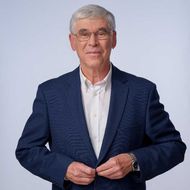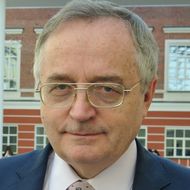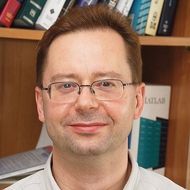Interviews with ICEF Academics Anna Yurko, Emiliano Catonini, and Udara Peiris were published in July issue of The HSE LooK. Here you may find some extracts.
We asked the professors to cite a quote or a maxim that in their opinion can at best describe the academic year 2013-2014 as they experienced it.
Dr. Anna Yurko characterised academic activity as a never ending quest. She chose to cite the words of Mark Twain, who said, “Education: the path from cocky ignorance to miserable uncertainty.”
Dr. Emiliano Catonini expressed somewhat similar feelings, and quoted Oscar Wilde to illustrate the general idea of academic achievement, who stated, “There are only two tragedies in life: one is not getting what one wants, and the other is getting it.”
 Dr. Emiliano Catonini, an Assistant Professor at the International College of Economics and Finance, joined the HSE in 2013 after defending his PhD thesis at Bocconi University (Milan) and has been living in Moscow since then.
Dr. Emiliano Catonini, an Assistant Professor at the International College of Economics and Finance, joined the HSE in 2013 after defending his PhD thesis at Bocconi University (Milan) and has been living in Moscow since then.
– What is your overall impression from your first academic year at the HSE?
– This is the first year that I am teaching as a professor and in general I am satisfied. My course in game theory attracted many students, although not all of them came with the right attitude. Master’s students are very determined and focused. But, Bachelor’s students are more difficult to interpret for me because they have very diverse interests and I have the impression that most of them don’t really understand what they want. It may also be due to the fact that they are very young here in Russia, on average one or two years younger than in Europe I would say.
As for my research I didn't have much time for it in the first semester, because I had to start teaching, find a flat, get acquainted with Moscow, socialise and actively participate to the life of our department. We are a small group and I believe we need to participate in all activities, even if not in our research field. Now I have more time to achieve what I wanted to achieve this year in terms of research. I will use the summer for this, so there won't be long holidays for me this year. I am concerned with the publication of three theoretical papers that I started in Milan when doing my PhD. The work that I do takes a lot of care, time and focus. But, it is also the time to act quickly, because there is a competition involving one of my topics. My co-author in Milan and I are at the frontier, but we have to speed up.
– How did you feel about moving to live in Moscow?
– I find Moscow quite a comfortable city to live. There are nice parks, the weather is not as bad as they told me and it is predictable. I like the city as a whole, its architecture and its strong character. Moscow is unique in the world; it has a real Russian touch to it. I'd put it among the five most beautiful cities I've ever seen. It's not a tourist-friendly city, you have to fight here to get what you want, and this is one of the things that I like.
.jpg) Dr. Udara Peiris received his PhD from the University of Oxford in 2010. He has been part of the HSE faculty for almost two years after accepting the position of Assistant Professor at the International College of Economics and Finance in 2012.
Dr. Udara Peiris received his PhD from the University of Oxford in 2010. He has been part of the HSE faculty for almost two years after accepting the position of Assistant Professor at the International College of Economics and Finance in 2012.
– What have you been working on at the HSE?
– Broadly, I am working on issues connected with macroeconomics and finance. One strand of my work is on monetary policy. I have two papers dealing with this issue: one on quantitative easing and another on nominal GDP-targeting, which is being pushed as an alternative to inflation targeting. Then the other strand of research I have is financial stability: I am looking at defaults and how this affects the macro economy. Part of my work here is teaching, of course. It's a valuable and incredibly fulfilling experience when students are really interested and engaged in what they study. There are times when students ask you questions and it pushes your own understanding. Other times, however, I find students are very practical and pragmatic about the degree they are pursuing. This is true not only in Russia, but all over the world. They see a degree as just a means to getting a job. And I see this is as a wrong and misinformed attitude. Many jobs in the financial and commercial sphere don't require an undergraduate degree at all: the knowledge from specialist certificates such as the “Chartered Financial Analyst” suffices. As a result, Higher Education will eventually return to what it was originally – an elite institution, a place where people go to develop their understanding, as opposed to knowing facts, which will push their careers further on, build a network and help formulate long-term flexible career goals.
– If it’s not about finding a job, then what should be the goal of higher education?
– The goal is to give students the skills to interpret what is going on in the world, to understand what is happening in the commercial environment, if that's what they study. It's a way of thinking. Most people go through between two and three careers in their lives, they change their track completely several times. In the meantime they are also changing multiple jobs. This requires the ability to be able to interpret the way the world is changing and being flexible. This is really what the value of education is. It is disappointing when students don't really see this and fight against this sort of training. I find it quite strange if not disturbing that so many undergraduates are working full-time while pursuing the degree. The fact that so many students are working just shows what the whole attitude of the system is towards education, which is just a means to an ends rather than a way to help shape a kind of thinking.
.jpg) Dr. Anna Yurko, an Assistant Professor at the International College of Economics and Finance, got her PhD from the University of Texas in 2008. Since then she has been working at the HSE. In 2012 and 2013 she was voted by students as one of the department's best teachers.
Dr. Anna Yurko, an Assistant Professor at the International College of Economics and Finance, got her PhD from the University of Texas in 2008. Since then she has been working at the HSE. In 2012 and 2013 she was voted by students as one of the department's best teachers.
—What is your general feeling about the academic year 2013-2014?
— This year I felt there was a normal working process going on. My general feeling about academic work on the whole can be illustrated by the quote that you asked me to pick for this interview. The one I selected was by Mark Twain, one of my favourite authors, who said that education is “the path from cocky ignorance to miserable uncertainty”. It highlights the specificities of life in academia. However, the uncertainty is actually not only miserable, but also is a wonderful thing, full of opportunities. But there is some amount of misery in it – it's the constant feeling of dissatisfaction. The horizons of academic activity are very broad, so my colleagues and I permanently have that feeling that we could do better and more then we actually do. You always have this thought that what you do is not enough. Nevertheless, this is a positive feeling as it gives you stimulus to pursue further endeavors.
— Were there any changes in the direction of your scientific work since you joined the HSE?
— The sphere of my scientific interest has changed quite radically. I graduated from the PhD programme in Austin, Texas with a thesis on macroeconomics.
I was an expert in macroeconomics and industrial organisation. This combination of macro and micro is not very common – I was applying macroeconomic approaches to microeconomic analysis and tasks. I planned to further develop in this direction. But at the HSE new interests arose and this is quite natural. Interests are important, and so are the instruments and data you use to achieve your research goals. Taking these factors into account I changed the sphere of my expertise towards labour and family economics. It is also interesting to work with the Russian data and deal with the issues that are significant for this country. Working in this sphere I began a fruitful co-authorship with my colleague from ICEF, Dr. Fabian Slonymzyk, a specialist in labour economics. I have a good knowledge of structural modeling due to my background in macroeconomics, and Fabian is an applied microeconomist, so our alliance turned out to be a great combination. This year our first joint work was published in Labour Economics, and this is my first article in this new field. It is not easy switching to a new sphere of research – you have to learn a lot and things do not go as fast as you would like them to. But it gives you new ideas and topics to explore, so there are endless opportunities for development.
More interviews with HSE faculty can be found in The HSE LooK 6(13), July 2014





.jpg)
.jpg)